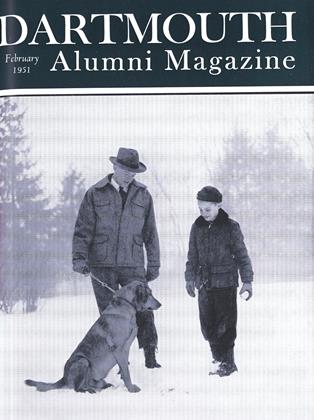WITH the death of Mrs. Eleanor Louise Frost, at the age of 101, on December 24, Hanover lost its oldest resident and Dartmouth one of its staunchest friends.
With her husband, and after his death, she extended help to many Dartmouth students, but there is no way of knowing the extent of this generosity as it was done quietly. Admiring good plays and acting, she was a spectator whenever possible at Players' productions. However, she was especially interested in seeing "what the boys could do of their own." To encourage individual talent she offered annually a prize of $100 for the best original student play, and she followed the Experimental Theatre with the greatest interest. One of the last arrangements she completed, two days before her death, was to perpetuate the Eleanor Frost Award for Dartmouth undergraduate playwrights.
As all her large and devoted circle of friends know, Mrs. Frost had the talent for contentment, as well as for passing it on to others. She enjoyed and played a good hand of bridge; her love of companionship made her a wholehearted participant of community gatherings; most of all, perhaps, she enjoyed her friends, representing all ages and ranks of life, who came to see her at her apartment in Parkside. Up to the last hours of her life she welcomed those it was possible for her to see.
Born in Vershire, Vt., August 22, 1849, the daughter of Josiah and Roxana Flanders, she attended Bradford Academy, and married on February 28, 1874, Newton A. Frost. The couple came to Hanover to live and Mr. Frost became eventually president of the Dartmouth Bank. The Frosts never forgot the help they received from friends and relatives when they were starting out, and in turn their generosity was extended to others.
Professor-Emeritus E. Bradlee Watson '02, one of Mrs. Frost's closest friends, wrote of her: "It was impossible for any of her intimate friends to think of her as an old lady. Nor could any call her merely saintly—she was something much better: a very true and lovable human being."
 View Full Issue
View Full Issue
More From This Issue
-
 Article
ArticleThe Student Days of Richard Hovey
February 1951 By EDWARD C. LATHEM '51 -
 Class Notes
Class Notes1929
February 1951 By F. WILLIAM ANDRES, EDWIN C. CHINLUND, JACK D. GUNTHER -
 Article
ArticleSIGHTED and SUNK
February 1951 By JOHN HURD '21 -
 Class Notes
Class Notes1918
February 1951 By ERNEST H. EARLEY, DONALD L. BARR, DAVID L. GARRATT -
 Class Notes
Class Notes1933
February 1951 By GEORGE F. THERIAULT, LEE W. ECKELS -
 Class Notes
Class Notes1905
February 1951 By GEORGE W. PUTNAM, GILBERT H. FALL







